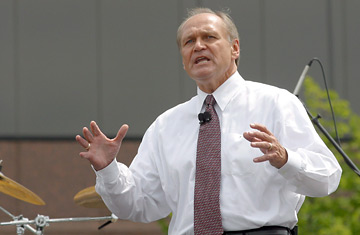
Chrysler Chairman and CEO Bob Nardelli addresses employees from a concert stage during 'First Day' celebrations at Chrysler headquarters in Auburn Hills, Michigan, USA, 06 August 2007.
Robert Nardelli took off his jacket and worked the crowd in his shirt sleeves. On Monday, Chrysler's new CEO told hundreds of employees gathered on the lawn at the company's Auburn Hills, Michigan, headquarters he wanted to restore the automaker's status in the world. "I look forward to rolling up my sleeves and getting to work with all of you," said Nardelli. There's a lot to work to do — and a lot of impressions to erase.
The first impression to change is Nardelli's own. His most recent manifestation in the business news pages was in January, as the overpaid and under-performing CEO of Home Depot, leaving that company with a gigantic $200 million goodbye package. On Monday, Nardelli made a point of telling reporters his compensation package with Cerberus Capital Management, the private equity fund that is Chrysler's new owner, is linked to the automaker's ultimate success. Nardelli, a management whiz at General Electric, where he was once a candidate to succeed Jack Welch, said he won't make any money unless Chrysler's makes a positive turnaround.
The second image needing to change is Chrysler's. The company lost $1.4 billion last year and its sales have been slipping so far this year. Tom Libby, an analyst with J.D. Power & Associates, said Chrysler is facing some serious challenges. Last month, for example, the Toyota Tundra pickup truck outsold the Dodge Ram pickup, which has long been considered one of the company's key vehicles. "This where they make their profits. They have to protect this segment," Libby said. In addition, Honda surged past Chrysler in total sales in July, leaving the new company in fifth place in total sales behind GM, Toyota and Ford, as well as Honda.
The deal that turned Chrysler into a privately held company has not received good reviews. It was nominally valued at $7.4 billion, but DaimlerChrysler, the German owners, covered a significant part of Cerberus's costs. In addition, DaimlerChrysler agreed to new financing arrangements last week to finalize the deal after outside investors snubbed the bonds that were supposed to finance it. The debt offering was pulled from the market and DaimlerChrysler and Cerberus will take on $2 billion of second lien debt on Chrysler's automotive business. (DaimlerChrysler's portion will be $1.5 billion.) DaimlerChrysler officials insisted the initial debt offering was pulled off the market only because of uncertainty in the financial world involving subprime mortgages in the United States, not because the deal underlying the bonds was flawed. Nardelli made it a point on Monday to deny he was brought in by Cerberus at the last minute to help shore up the financing behind Cerberus's takeover of Chrysler.
Shoring up finances is one thing. Labor is another. Chrysler's current contract with the United Auto Workers expires Sept. 14 and so far Chrysler's hasn't even gotten the kind of health-care concessions that General Motors and Ford won from the UAW back in 2005. Ron Gettelfinger, the UAW's president, has indicated he is willing to listen to the company's arguments for concessions. But he has also said it is grossly unfair to have the onus for bailing out troubled automakers placed squarely on the backs of his members and retirees rather than other stakeholders, including the U.S. government.
Nor is it certain that Chrysler's 40,000 unionized employees, who include both blue-and white-collar workers, would approve a concession package. Gettelfinger pointedly brought up Nardelli's status as a poster-child for excessive executive compensation in a private, two-hour meeting with the former Home Depot CEO last week. "Mr. Gettelfinger had come well prepared," Nardelli said. The union frustrated DaimlerChrysler chief executive Dieter Zetsche no end and undoubtedly contributed to the German automaker's decision to auction off it's American unit. Cerberus Capital Management has now inherited from Daimler the $18 billion in unfunded retiree health-care obligations.
Nardelli, however, said he is counting on Tom LaSorda, who was demoted from CEO to president and vice chairman within 48 hours after Cerberus took control of the company, to help smooth over relations with the union. LaSorda said he stayed on because he thought he could work successfully with Nardelli. "I liked the guy," LaSorda said in recouting his first meeting with Nardelli two weeks ago. Still, said Buzz Hargrove, president of the Canadian Auto Workers union at a conference in Detroit, "Even if the Big Three [Ford, GM and Chrysler] get everything they are asking for from the UAW, that would reduce the average production costs of a vehicle they sell in North America by only $500. This is equal to less than 2% of the average selling price of a new vehicle in the U.S. and one-sixth the current sales incentives which the Big Three are currently using to sell new vehicles."
Nevertheless, in a conciliatory sign, Gettelfinger showed up for Monday's noontime celebration of what Chrysler officials had taken to describing as "Independence Day." He welcomed Nardelli publicly. "We look forward to working with both him and Tom LaSorda," said Gettelfinger. "Now is not the time to look back." Chrysler employees were optimistic as well. "Who wants to be doom and gloom? said Jim Knight, a 15-year Chrysler veteran, echoing many of his colleagues. Knight, who works inside the metal shop at the company's Auburn Hills Technical Center, said, "There have been a lot of up and downs [in recent months]. Hopefully, we'll be able to keep our jobs and keep building cars." Meanwhile, Nardelli's labors will have to wait a bit. Right after the "Independence Day" celebration, he left for what was described as a long-planned family vacation in Mexico.
